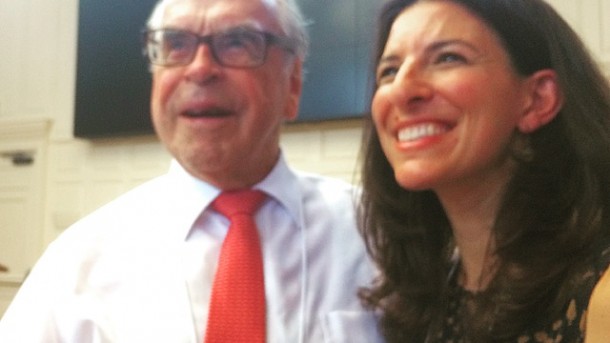Hello from Princeton where I joyously spent my Moltmann Monday morning with Professor Moltmann himself! (And unabashedly approached him at the banquet last night, where my daughter- who came along to meet this theologian her mom always talks about- snapped this picture). He came to kick off the opening lecture for the Karl Barth Conference, entitled “Predestination: Karl Barth’s Doctrine of the Election of Grace.” I didn’t take fantastic notes because I wanted to enjoy just listening to him, but here are a few highlights.
“Before God says ‘you shall be my people,’ God says ‘I shall be your God.'”
If you want the simplest and fastest overview of Moltmann’s thoughts on election, this is it. Election is not about us, but about God. God has elected to be our God, and has elected to be in relationship with us and all of creation. God has said yes. Election is not on a case-by-case basis or even an individual understanding but an acknowledgment that God has first chosen to be our God, and that doesn’t change, regardless of whether we choose to be God’s people.
It came up in the Q&A whether this was overly forceful of God, as if God is removing our choice in the matter. He cautioned that our understanding of personal freedom is particularly American and not necessarily or probably biblical. He joked,
“I know I am speaking in America and I am an old European, but freedom is not an attribute of a subject; it is an act/term of relationship.”
He responded in the Q&A by asking the person, “If your daughter decided to cut all ties, would you not still be her mother?” For Moltmann, election points to a covenantal relationship founded on grace. God’s loyalty does not change even if ours does. Some people find this offensive, and/or problematic. Moltmann would say we have a tendency to put our American views of freedom even toward God, assuming that God always has this wide open choice. He boldly fought back against that notion last night, asking whether God’s nature would not in some respect determine God’s will. The nature of God is love. Is God really “free” to go against this nature in what God wills or does? Would that not make God inconsistent in nature, rather than steadfast? He said, “God chooses that which corresponds to his nature.” And, if you look at the arc of scripture, (and if I could quote Scripture as rapidly or thoroughly as Moltmann does), you can see a compelling narrative for this. The idea that election is based anywhere else but the nature (and, by extension, will) of God is where Moltmann and Barth overlap and find resonance with one another, even if Moltmann tries to push the conclusion further than Barth was willing to go.
Moltmann said what we receive from election is this assurance:
God has elected me. I can never again be lost to God.
This doesn’t mean we can’t turn away from God or move away from God or even go against God. It means no matter what we do, we cannot go somewhere God cannot find us. God has chosen to be our God before we are asked to be God’s people.
Beautiful. (And, I believe, true.) We lose sight of God and our own selves when we talk of life “outside of God.” There is no outside. There may be near and far. There may be faithful and unfaithful. But there is no outside.
I want to share with you one last line, which I think is apropos for this week as we continue to wrestle with the reality of Charleston. Moltmann concluded his lecture by saying the election of grace leaves us a strong place from which to live, and act, and find hope. It is, simply:
God is faithful. Resist!
In the face of tragedy, of racism, of systemic injustice, of ecological crisis, of human faithlessness, we find solace in the steadfast love of God, who is patient but is faithful to bring about what God promises. Because we trust in this, we can find hope to resist the powers that move against life, and seek instead the beloved community in which all belong to a God who has chosen us, above it all and after it all.
I believe the Barth Center is going to post the video and/or audio of his lecture online, and I’ll try to remember to share that here when it comes available!

Add Your Voice!